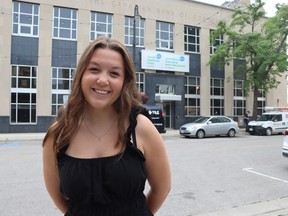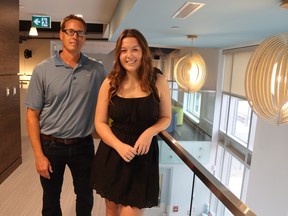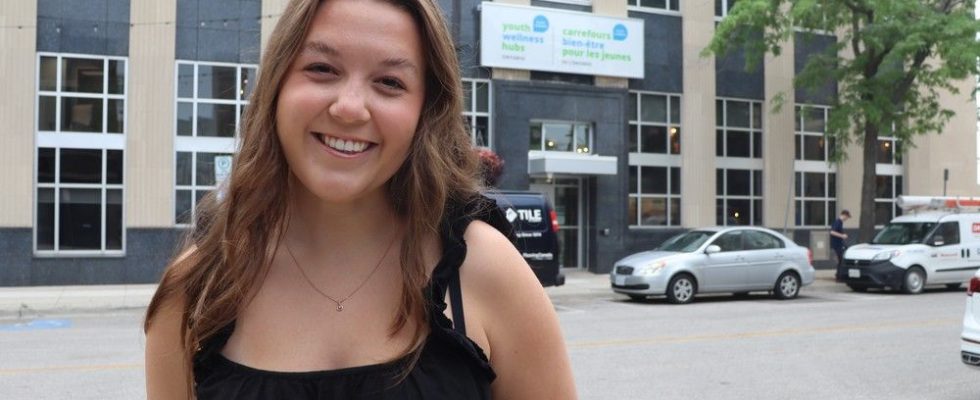Labadie said the hub was “four years in the making” and she and several other council members stayed involved during all that time “because it’s super important to us.”

It took longer than expected for a Youth Wellness Hub Ontario to open in downtown Sarnia but it was worth the wait, says Janessa Labadie.
Advertisement 2
Labadie is co-chairperson of Spoken Hope, a youth advisory council involved in developing and designing the hub first announced for Sarnia before the pandemic, which ended up delaying construction at the former bank building where the mental health and addiction care hub for youth aged 12 to 25 and their families opened recently.
“The wait was worth it,” she said. “It gave us more time to refine some of our ideas and make some last minute changes.”
Labadie said the hub was “four years in the making” and she and several other council members stayed involved during all that time “because it’s super important to us.”
The Partners – St. Clair Child & Youth Services, Bluewater Health, Canadian Mental Health Association (CMHA) Lambton Kent and the Bluewater Health Foundation – raised $3 million in the community to create the hub in space provided by Lambton County. It’s designed to provide young people with quick access to mental health and addictions education, assessments, counseling and treatment.
Advertisement 3
The partnership began in 2018 and they worked with Youth Wellness Hubs Ontario which already had a location in Chatham-Kent, said Paula Reaume-Zimmer, CEO of Bluewater Health.
“Very quickly the provincial leaders saw that our community was extremely ready for this type of initiative,” she said.
The Sarnia hub has funding of $450,000 a year in place, with several agencies contributing staff and other resources, Reaume-Zimmer said.
Along with the partners, those agencies include the county, Rebound and local school boards.
“It’s about everyone coming to the table to contribute to a successful care plan,” Reaume-Zimmer said.
“We don’t want youth who are struggling with mental health or substance use to have to go door-to-door.”
Advertisement 4
Those young people and their families “are already at a challenging point in their life,” she said. “It’s really removing the frustration, and being under one roof, and being able to act like one team.”
Services include counselling, peer support, crisis intervention and access to specialized care, when needed. That includes help for those needing housing and a nurse practitioner who will be at the hub one day a week and available for walk-in appointments.
The hub opened its doors July 11 and is initially providing booked appointments mainly, as well as walk-ins, said Tim Health, manager of youth services. It’s currently open five days a week, Reaume-Zimmer said.

Plans are to offer public tours of the hub Aug 22, noon to 2 pm, during an official opening. The site is at 190 Front St., but the main entrance is on Lochiel Street.
Advertisement 5
“It’s so much better than what I had ever envisioned,” Labadie said about the hub which was designed to be welcoming, with plenty of private meeting spaces as well as open spaces, including a kitchen on the upper level.
“It really puts a smile on your face when you walk in,” Reaume-Zimmer said.
Plenty of the credit goes to the members of Spoken Hope, she said.
“It shows that when you work closely with the sector you’re caring for, you can get it right.”
Efforts were also made to maintain the former bank’s features, including tall windows and a large vault that was converted in a small gathering space.
“I think this is going to be a game-changer for mental health in the community for youth,” Labadie said.
“I think it will be a space where youth will actually feel welcome and will want to receive services compared to some places that may not be as friendly and welcoming. The space here is very non-clinical.”
It can be hard to “navigate services, especially if you’re in crisis,” Labadie said.
“Also, for young people, it can be very intimidating to walk in and say, ‘I need help.’”
The hub was designed to be somewhere it’s easier to do that, she said.
“There’s a lot of evidence that shows that when we can engage youth earlier in their experience we can avoid the long-term effects of mental health and substances abuse,” Reaume-Zimmer said.
“That’s really the objective.”

Comments
Postmedia is committed to maintaining a lively but civil forum for discussion and encourages all readers to share their views on our articles. Comments may take up to an hour for moderation before appearing on the site. We ask you to keep your comments relevant and respectful. We have enabled email notifications—you will now receive an email if you receive a reply to your comment, there is an update to a comment thread you follow or if a user you follow comments. Visit our Community Guidelines for more information and details on how to adjust your email settings.
Join the Conversation